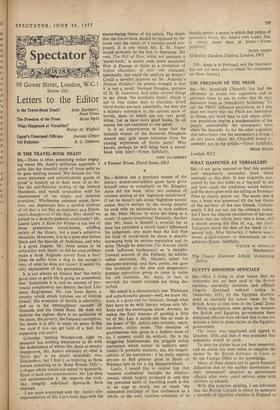IS THE TRAVEL-BOOK DEAD?
SIR,—There is often something rather engag- ing about Mr. Amis's utilitarian approach. I quite like the cheerful crash of brass tacks as he goes mulling around. 'His distaste for 'the more elaborate and unfashionable graces of prose' is breezily up to date; most of us dis- like the sub-Patcrian writing of the bastard Mandarin, and would sympathise with his chastisement of 'an empty and indecent poeticism.' Wholesome common sense, how- ever, can degenerate into a morbid mistrust of all that is not flat, as irrational as a Dutch- man's disapproval of the Alps. Why should we submit to a drearily pedantic conformity? Mr. Laurie Lee's A Rose for Winter is not one of those pretentious travel-books, whiffing stalely of the library, but a poet's subjective chronicle. Moreover, it is by a poet who knows Spain and the Spanish of Andalusia, and who is a good linguist. Mr. Amis seems to be unfamiliar with Spain; or did he once perhaps make a brisk Anglican survey from a bus? Does he suffer from a dog in the manger's envy of what he does not know? It seems the only explanation of his grumpiness.
It is not always an illusion that 'the really good time or good life is going on somewhere else.' Sometimes it is, and no amount of pro- vincial complacency can destroy the fact. Like many Englishmen, Mr. Lee loves Spain, a country which struck lyricism out of George Orwell. His evocation of Seville is admirable, and so is his extraordinary account of Granada and his illness there. He does not endorse the regime, there is no palliation of the pains, the poverty, the frequent corruption. No doubt it is silly to sleep on straw in the inn yard if you can get hold of a bed; but supposing you can't?
Coleridge 'putting Wordsworth right on peasants' has nothing whatsoever to do with the Andalusians of whom Mr. Amis so smugly disapproves. Mr. Amis's advocacy of what is 'fairly gay' is no doubt splendidly nco- Elizabethan, but I find it as inspiring as those notices exhorting us to 'Keep Britain Tidy'—.- a slogan which would not appeal to Spaniards. Spain is hard and unsentimental. Mr. Lee does not sentimentalise it. He respects the rock- like integrity individual Spaniards have • retained.
I am more concerned with Mr. Amis's mis- representation of Mr. Lee's book than with the unconvincing theme of his article. The thesis that the travel-book should be replaced by the novel only the vanity of a novelist could pro- pound. It is one which Mr, E. M. Foster would probably be the first to deprecate. His own, The Hill of Devi, while not precisely a 'travel-book,' is surely even more successful than A Passage to India as a revelation of Indian character; of only one character, admittedly, but could the analysis go deeper? Could a novelist improve on Mr. Ackerley's Hindoo Holiday? Its precise strength is that it is not a novel. Norman Douglas, apropos of D. H. Lawrence, had some shrewd things to say about 'the novelist's touch,' which is apt to blur rather than to elucidate. Good travel-books are rare, admittedly, but they are a salutary corrective to the current spate of novels, most of which are not very good, either. Let us have more good books, by all means, but not restricted to one genre.
Is it an impertinence to hope that the talented winner of the Somerset Maugham Award may gain some tolerance from his coming experience of furrin parts? Who knows, perhaps he will bring hack a travel-
book with him?—Yours faithfully, ' JOHN DAVENPORT
4 Rossetti House, Flood Street, SIV3

















































 Previous page
Previous page